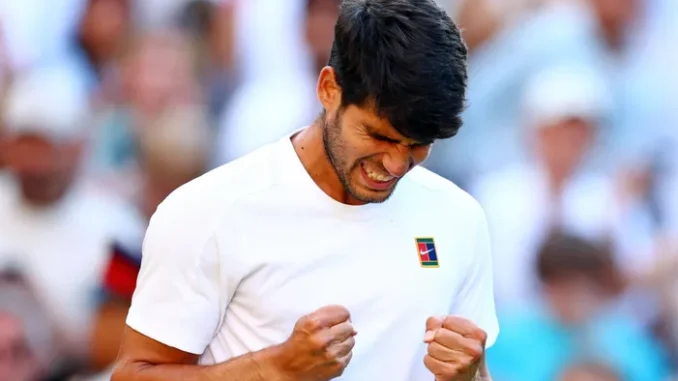
On July 13, 2025, the hallowed grass of Wimbledon’s Centre Court bore witness to a gripping men’s final where Carlos Alcaraz, the two-time defending champion, fell to world No. 1 Jannik Sinner in a four-set battle, 4-6, 6-4, 6-4, 6-4. The defeat marked Alcaraz’s first loss in a Grand Slam final, ending his 24-match winning streak that included titles at the French Open and Queen’s Club earlier in the year. As the 22-year-old Spaniard processed the setback, former world No. 2 Alex Corretja, a respected voice in tennis, offered heartfelt advice, urging Alcaraz’s team to prioritize rest over the upcoming Canadian Open in Montreal. “Please don’t let him go,” Corretja pleaded, emphasizing the toll of Alcaraz’s relentless 2025 season. His counsel, rooted in admiration for the young star’s drive, sparked a broader conversation about balancing ambition with well-being in the high-stakes world of professional tennis.
Alcaraz’s 2025 has been nothing short of extraordinary. With victories at Roland Garros, Rome, Monte-Carlo, Rotterdam, and Queen’s, the world No. 2 has cemented his status as a tennis prodigy, amassing five Grand Slam titles by age 22. Yet, his Wimbledon loss to Sinner, who avenged a heartbreaking French Open final defeat from five weeks prior, highlighted the physical and emotional demands of his packed schedule. “I just left the court with the head really, really high because I did everything that I could today,” Alcaraz said post-match, showcasing his resilience. Despite landing 15 aces, his first-serve percentage dipped to 53%, and Sinner’s relentless baseline game pushed him to his limits. “He was pushing me to the limit in every point,” Alcaraz admitted, acknowledging the Italian’s “stratospheric” performance, as Corretja described it.
Corretja, speaking as a seasoned analyst, saw the defeat as a pivotal moment for growth. “Everything that’s happening to Alcaraz is good: when he wins and when he doesn’t,” he said, noting that losses fuel a champion’s hunger. “If you only win, you think you’re doing everything right. If you get beaten, then you think you’re not unbeatable.” He praised the Sinner-Alcaraz rivalry, dubbed “Sincaraz,” which has seen them split the last seven Grand Slams, evoking the Nadal-Federer era. Yet, Corretja’s primary concern was Alcaraz’s well-being. “We’re not talking about whether he won the Wimbledon final or lost it,” he explained. “We’re talking about the fact that he’s been in London for a month, that he won Queen’s… all of that takes its toll.” The grueling schedule—surface changes, press conferences, doping controls, and travel—has left Alcaraz at risk of burnout, especially with the Canadian Open looming on July 26, offering an £820,000 prize but demanding another cross-continental trip.
Corretja’s advice was clear: Alcaraz should skip Montreal to recharge for the North American hard-court season, including the Cincinnati Open and US Open, where Sinner defends his title. “I think Carlos Alcaraz needs a bit of rest right now, so that in the second half of the season, when he sometimes loses some steam, he doesn’t really end up feeling so weak,” Corretja urged, respecting the decisions of Alcaraz’s coach, Juan Carlos Ferrero, his “great friend.” He added, “They should seriously consider what they have to do, and whatever they decide will be fine because they are the team. But from the outside, I think, please don’t let him go.” This plea echoed Corretja’s earlier concerns after Alcaraz’s 2024 US Open second-round exit, where he argued the Spaniard’s intense summer—Wimbledon, the Olympics, and doubles with Rafael Nadal—left him mentally and physically drained, not a step backward as Alcaraz had feared.
Alcaraz, however, remained defiant, insisting he was “not bad at all” emotionally, unlike his post-Olympics struggles in 2024 after losing to Novak Djokovic. “I think in the last year I’ve been through enough different situations that I learned from them,” he said, signaling maturity. His off-court charm—practicing on Wimbledon’s outside courts to engage fans and dining locally—has endeared him to crowds, but Corretja warned that the “tremendous emotional wear and tear” of global stardom, from documentaries to exhibitions, requires careful management. “I think it’s a shame that there should only have been one winner,” Corretja said of the Wimbledon final, praising both players’ “unreal” level. Yet, he believes rest could position Alcaraz to reclaim the No. 1 ranking and contend for the US Open or year-end Masters.
The tennis world, buzzing on platforms like X, sees Alcaraz’s loss as a chapter in a burgeoning rivalry. “The life repaid Sinner for what it took from him in Paris,” Corretja reflected, noting the Italian’s mental fortitude. As Alcaraz prepares for the hard courts, his team faces a critical decision: heed Corretja’s call for rest or chase the £820,000 prize in Canada. With King Felipe VI’s post-match encouragement—“Has dado lo mejor de ti” (“You gave your best”)—and a nation behind him, Alcaraz’s next move will shape his quest to dominate tennis’s biggest stages once more.
Leave a Reply